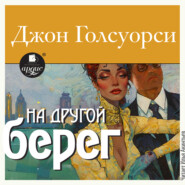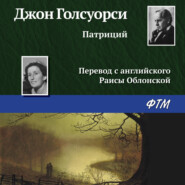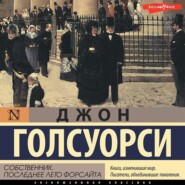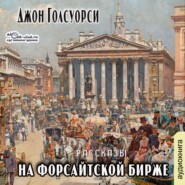По всем вопросам обращайтесь на: info@litportal.ru
(©) 2003-2024.
✖
The Forsyte Saga, Volume I. The Man Of Property
Настройки чтения
Размер шрифта
Высота строк
Поля
Mrs. Nicholas, an effete woman, smiled a smile of frightened jollity behind his back.
“Mr. and Mrs. James Forsyte! Mr. and Mrs. Soames Forsyte!”
Swithin drew his heels together, his deportment ever admirable.
“Well, James, well Emily! How are you, Soames? How do you do?”
His hand enclosed Irene’s, and his eyes swelled. She was a pretty woman – a little too pale, but her figure, her eyes, her teeth! Too good for that chap Soames!
The gods had given Irene dark brown eyes and golden hair, that strange combination, provocative of men’s glances, which is said to be the mark of a weak character. And the full, soft pallor of her neck and shoulders, above a gold-coloured frock, gave to her personality an alluring strangeness.
Soames stood behind, his eyes fastened on his wife’s neck. The hands of Swithin’s watch, which he still held open in his hand, had left eight behind; it was half an hour beyond his dinner-time – he had had no lunch – and a strange primeval impatience surged up within him.
“It’s not like Jolyon to be late!” he said to Irene, with uncontrollable vexation. “I suppose it’ll be June keeping him!”
“People in love are always late,” she answered.
Swithin stared at her; a dusky orange dyed his cheeks.
“They’ve no business to be. Some fashionable nonsense!”
And behind this outburst the inarticulate violence of primitive generations seemed to mutter and grumble.
“Tell me what you think of my new star, Uncle Swithin,” said Irene softly.
Among the lace in the bosom of her dress was shining a five-pointed star, made of eleven diamonds. Swithin looked at the star. He had a pretty taste in stones; no question could have been more sympathetically devised to distract his attention.
“Who gave you that?” he asked.
“Soames.”
There was no change in her face, but Swithin’s pale eyes bulged as though he might suddenly have been afflicted with insight.
“I dare say you’re dull at home,” he said. “Any day you like to come and dine with me, I’ll give you as good a bottle of wine as you’ll get in London.”
“Miss June Forsyte – Mr. Jolyon Forsyte!.. Mr. Boswainey!..”
Swithin moved his arm, and said in a rumbling voice:
“Dinner, now – dinner!”
He took in Irene, on the ground that he had not entertained her since she was a bride. June was the portion of Bosinney, who was placed between Irene and his fiancee. On the other side of June was James with Mrs. Nicholas, then old Jolyon with Mrs. James, Nicholas with Hatty Chessman, Soames with Mrs. Small, completing, the circle to Swithin again.
Family dinners of the Forsytes observe certain traditions. There are, for instance, no hors d’oeuvre. The reason for this is unknown. Theory among the younger members traces it to the disgraceful price of oysters; it is more probably due to a desire to come to the point, to a good practical sense deciding at once that hors d’oeuvre are but poor things. The Jameses alone, unable to withstand a custom almost universal in Park Lane, are now and then unfaithful.
A silent, almost morose, inattention to each other succeeds to the subsidence into their seats, lasting till well into the first entree, but interspersed with remarks such as, “Tom’s bad again; I can’t tell what’s the matter with him!” “I suppose Ann doesn’t come down in the mornings?” – “What’s the name of your doctor, Fanny?” “Stubbs?” “He’s a quack!” – “Winifred? She’s got too many children. Four, isn’t it? She’s as thin as a lath!” – “What d’you give for this sherry, Swithin? Too dry for me!”
With the second glass of champagne, a kind of hum makes itself heard, which, when divested of casual accessories and resolved into its primal element, is found to be James telling a story, and this goes on for a long time, encroaching sometimes even upon what must universally be recognised as the crowning point of a Forsyte feast – ’the saddle of mutton.’
No Forsyte has given a dinner without providing a saddle of mutton. There is something in its succulent solidity which makes it suitable to people ‘of a certain position.’ It is nourishing and tasty; the sort of thing a man remembers eating. It has a past and a future, like a deposit paid into a bank; and it is something that can be argued about.
Each branch of the family tenaciously held to a particular locality – old Jolyon swearing by Dartmoor, James by Welsh, Swithin by Southdown, Nicholas maintaining that people might sneer, but there was nothing like New Zealand! As for Roger, the ‘original’ of the brothers, he had been obliged to invent a locality of his own, and with an ingenuity worthy of a man who had devised a new profession for his sons, he had discovered a shop where they sold German; on being remonstrated with, he had proved his point by producing a butcher’s bill, which showed that he paid more than any of the others. It was on this occasion that old Jolyon, turning to June, had said in one of his bursts of philosophy:
“You may depend upon it, they’re a cranky lot, the Forsytes – and you’ll find it out, as you grow older!”
Timothy alone held apart, for though he ate saddle of mutton heartily, he was, he said, afraid of it.
To anyone interested psychologically in Forsytes, this great saddle-of-mutton trait is of prime importance; not only does it illustrate their tenacity, both collectively and as individuals, but it marks them as belonging in fibre and instincts to that great class which believes in nourishment and flavour, and yields to no sentimental craving for beauty.
Younger members of the family indeed would have done without a joint altogether, preferring guinea-fowl, or lobster salad – something which appealed to the imagination, and had less nourishment – but these were females; or, if not, had been corrupted by their wives, or by mothers, who having been forced to eat saddle of mutton throughout their married lives, had passed a secret hostility towards it into the fibre of their sons.
The great saddle-of-mutton controversy at an end, a Tewkesbury ham commenced, together with the least touch of West Indian – Swithin was so long over this course that he caused a block in the progress of the dinner. To devote himself to it with better heart, he paused in his conversation.
From his seat by Mrs. Septimus Small Soames was watching. He had a reason of his own connected with a pet building scheme, for observing Bosinney. The architect might do for his purpose; he looked clever, as he sat leaning back in his chair, moodily making little ramparts with bread-crumbs. Soames noted his dress clothes to be well cut, but too small, as though made many years ago.
He saw him turn to Irene and say something and her face sparkle as he often saw it sparkle at other people – never at himself. He tried to catch what they were saying, but Aunt Juley was speaking.
Hadn’t that always seemed very extraordinary to Soames? Only last Sunday dear Mr. Scole, had been so witty in his sermon, so sarcastic, “For what,” he had said, “shall it profit a man if he gain his own soul, but lose all his property?” That, he had said, was the motto of the middle-class; now, what had he meant by that? Of course, it might be what middle-class people believed – she didn’t know; what did Soames think?
He answered abstractedly: “How should I know? Scoles is a humbug, though, isn’t he?” For Bosinney was looking round the table, as if pointing out the peculiarities of the guests, and Soames wondered what he was saying. By her smile Irene was evidently agreeing with his remarks. She seemed always to agree with other people.
Her eyes were turned on himself; Soames dropped his glance at once. The smile had died off her lips.
A humbug? But what did Soames mean? If Mr. Scoles was a humbug, a clergyman – then anybody might be – it was frightful!
“Well, and so they are!” said Soames.
During Aunt Juley’s momentary and horrified silence he caught some words of Irene’s that sounded like: ‘Abandon hope, all ye who enter here!’
But Swithin had finished his ham.
“Where do you go for your mushrooms?” he was saying to Irene in a voice like a courtier’s; “you ought to go to Smileybob’s – he’ll give ‘em you fresh. These little men, they won’t take the trouble!”
Irene turned to answer him, and Soames saw Bosinney watching her and smiling to himself. A curious smile the fellow had. A half-simple arrangement, like a child who smiles when he is pleased. As for George’s nickname – ’The Buccaneer’ – he did not think much of that. And, seeing Bosinney turn to June, Soames smiled too, but sardonically – he did not like June, who was not looking too pleased.
This was not surprising, for she had just held the following conversation with James:
“I stayed on the river on my way home, Uncle James, and saw a beautiful site for a house.”
James, a slow and thorough eater, stopped the process of mastication.
“Eh?” he said. “Now, where was that?”
“Close to Pangbourne.”
James placed a piece of ham in his mouth, and June waited.
“I suppose you wouldn’t know whether the land about there was freehold?” he asked at last. “You wouldn’t know anything about the price of land about there?”
“Mr. and Mrs. James Forsyte! Mr. and Mrs. Soames Forsyte!”
Swithin drew his heels together, his deportment ever admirable.
“Well, James, well Emily! How are you, Soames? How do you do?”
His hand enclosed Irene’s, and his eyes swelled. She was a pretty woman – a little too pale, but her figure, her eyes, her teeth! Too good for that chap Soames!
The gods had given Irene dark brown eyes and golden hair, that strange combination, provocative of men’s glances, which is said to be the mark of a weak character. And the full, soft pallor of her neck and shoulders, above a gold-coloured frock, gave to her personality an alluring strangeness.
Soames stood behind, his eyes fastened on his wife’s neck. The hands of Swithin’s watch, which he still held open in his hand, had left eight behind; it was half an hour beyond his dinner-time – he had had no lunch – and a strange primeval impatience surged up within him.
“It’s not like Jolyon to be late!” he said to Irene, with uncontrollable vexation. “I suppose it’ll be June keeping him!”
“People in love are always late,” she answered.
Swithin stared at her; a dusky orange dyed his cheeks.
“They’ve no business to be. Some fashionable nonsense!”
And behind this outburst the inarticulate violence of primitive generations seemed to mutter and grumble.
“Tell me what you think of my new star, Uncle Swithin,” said Irene softly.
Among the lace in the bosom of her dress was shining a five-pointed star, made of eleven diamonds. Swithin looked at the star. He had a pretty taste in stones; no question could have been more sympathetically devised to distract his attention.
“Who gave you that?” he asked.
“Soames.”
There was no change in her face, but Swithin’s pale eyes bulged as though he might suddenly have been afflicted with insight.
“I dare say you’re dull at home,” he said. “Any day you like to come and dine with me, I’ll give you as good a bottle of wine as you’ll get in London.”
“Miss June Forsyte – Mr. Jolyon Forsyte!.. Mr. Boswainey!..”
Swithin moved his arm, and said in a rumbling voice:
“Dinner, now – dinner!”
He took in Irene, on the ground that he had not entertained her since she was a bride. June was the portion of Bosinney, who was placed between Irene and his fiancee. On the other side of June was James with Mrs. Nicholas, then old Jolyon with Mrs. James, Nicholas with Hatty Chessman, Soames with Mrs. Small, completing, the circle to Swithin again.
Family dinners of the Forsytes observe certain traditions. There are, for instance, no hors d’oeuvre. The reason for this is unknown. Theory among the younger members traces it to the disgraceful price of oysters; it is more probably due to a desire to come to the point, to a good practical sense deciding at once that hors d’oeuvre are but poor things. The Jameses alone, unable to withstand a custom almost universal in Park Lane, are now and then unfaithful.
A silent, almost morose, inattention to each other succeeds to the subsidence into their seats, lasting till well into the first entree, but interspersed with remarks such as, “Tom’s bad again; I can’t tell what’s the matter with him!” “I suppose Ann doesn’t come down in the mornings?” – “What’s the name of your doctor, Fanny?” “Stubbs?” “He’s a quack!” – “Winifred? She’s got too many children. Four, isn’t it? She’s as thin as a lath!” – “What d’you give for this sherry, Swithin? Too dry for me!”
With the second glass of champagne, a kind of hum makes itself heard, which, when divested of casual accessories and resolved into its primal element, is found to be James telling a story, and this goes on for a long time, encroaching sometimes even upon what must universally be recognised as the crowning point of a Forsyte feast – ’the saddle of mutton.’
No Forsyte has given a dinner without providing a saddle of mutton. There is something in its succulent solidity which makes it suitable to people ‘of a certain position.’ It is nourishing and tasty; the sort of thing a man remembers eating. It has a past and a future, like a deposit paid into a bank; and it is something that can be argued about.
Each branch of the family tenaciously held to a particular locality – old Jolyon swearing by Dartmoor, James by Welsh, Swithin by Southdown, Nicholas maintaining that people might sneer, but there was nothing like New Zealand! As for Roger, the ‘original’ of the brothers, he had been obliged to invent a locality of his own, and with an ingenuity worthy of a man who had devised a new profession for his sons, he had discovered a shop where they sold German; on being remonstrated with, he had proved his point by producing a butcher’s bill, which showed that he paid more than any of the others. It was on this occasion that old Jolyon, turning to June, had said in one of his bursts of philosophy:
“You may depend upon it, they’re a cranky lot, the Forsytes – and you’ll find it out, as you grow older!”
Timothy alone held apart, for though he ate saddle of mutton heartily, he was, he said, afraid of it.
To anyone interested psychologically in Forsytes, this great saddle-of-mutton trait is of prime importance; not only does it illustrate their tenacity, both collectively and as individuals, but it marks them as belonging in fibre and instincts to that great class which believes in nourishment and flavour, and yields to no sentimental craving for beauty.
Younger members of the family indeed would have done without a joint altogether, preferring guinea-fowl, or lobster salad – something which appealed to the imagination, and had less nourishment – but these were females; or, if not, had been corrupted by their wives, or by mothers, who having been forced to eat saddle of mutton throughout their married lives, had passed a secret hostility towards it into the fibre of their sons.
The great saddle-of-mutton controversy at an end, a Tewkesbury ham commenced, together with the least touch of West Indian – Swithin was so long over this course that he caused a block in the progress of the dinner. To devote himself to it with better heart, he paused in his conversation.
From his seat by Mrs. Septimus Small Soames was watching. He had a reason of his own connected with a pet building scheme, for observing Bosinney. The architect might do for his purpose; he looked clever, as he sat leaning back in his chair, moodily making little ramparts with bread-crumbs. Soames noted his dress clothes to be well cut, but too small, as though made many years ago.
He saw him turn to Irene and say something and her face sparkle as he often saw it sparkle at other people – never at himself. He tried to catch what they were saying, but Aunt Juley was speaking.
Hadn’t that always seemed very extraordinary to Soames? Only last Sunday dear Mr. Scole, had been so witty in his sermon, so sarcastic, “For what,” he had said, “shall it profit a man if he gain his own soul, but lose all his property?” That, he had said, was the motto of the middle-class; now, what had he meant by that? Of course, it might be what middle-class people believed – she didn’t know; what did Soames think?
He answered abstractedly: “How should I know? Scoles is a humbug, though, isn’t he?” For Bosinney was looking round the table, as if pointing out the peculiarities of the guests, and Soames wondered what he was saying. By her smile Irene was evidently agreeing with his remarks. She seemed always to agree with other people.
Her eyes were turned on himself; Soames dropped his glance at once. The smile had died off her lips.
A humbug? But what did Soames mean? If Mr. Scoles was a humbug, a clergyman – then anybody might be – it was frightful!
“Well, and so they are!” said Soames.
During Aunt Juley’s momentary and horrified silence he caught some words of Irene’s that sounded like: ‘Abandon hope, all ye who enter here!’
But Swithin had finished his ham.
“Where do you go for your mushrooms?” he was saying to Irene in a voice like a courtier’s; “you ought to go to Smileybob’s – he’ll give ‘em you fresh. These little men, they won’t take the trouble!”
Irene turned to answer him, and Soames saw Bosinney watching her and smiling to himself. A curious smile the fellow had. A half-simple arrangement, like a child who smiles when he is pleased. As for George’s nickname – ’The Buccaneer’ – he did not think much of that. And, seeing Bosinney turn to June, Soames smiled too, but sardonically – he did not like June, who was not looking too pleased.
This was not surprising, for she had just held the following conversation with James:
“I stayed on the river on my way home, Uncle James, and saw a beautiful site for a house.”
James, a slow and thorough eater, stopped the process of mastication.
“Eh?” he said. “Now, where was that?”
“Close to Pangbourne.”
James placed a piece of ham in his mouth, and June waited.
“I suppose you wouldn’t know whether the land about there was freehold?” he asked at last. “You wouldn’t know anything about the price of land about there?”

















